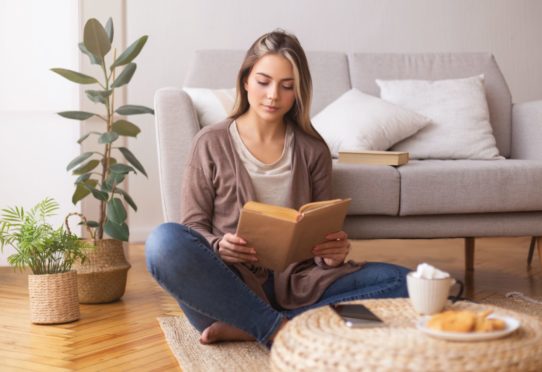
Feeling the pressure to be doing lockdown “well”? Whether it’s making the most of the extra time with side projects and challenges, or trying to stay endlessly positive, could these seemingly well-meaning habits be piling more pressure on an already difficult time?
As we face at least another month at home with nothing much to look forward to, mental health experts agree that simply being kind to ourselves is the best advice – after all getting through the next few weeks with our sanity intact will be a triumph.
“I don’t think any of us can be good at a pandemic,” says senior therapist and author Sally Baker (workingonthebody.com). Unprecedented may be a word we’re sick of hearing but she says it’s useful to remember what it really means: we’re in brand new – and epically hard – territory, and our brains don’t come with a how to cope in a pandemic roadmap.
So, going into “meltdown” in lockdown one was a very normal reaction, she reassures, and we’re still feeling our way.
“People have had to dig even deeper with their coping strategies because we’re now in winter, which has a different set of challenges,” says Baker, whose next book is focused on human resilience.
Ditching shoulds
There’s a lot to be said about keeping busy, of course, and doing the things that help us stay buoyed. Routines and challenges might keep us anchored, steady and motivated – and if lockdown has created space for getting that project done or working towards a goal, fantastic.
But if we feel we should be constantly productive and achieving, and things intended to help us feel better end up becoming another stick to bash ourselves with when we fail to keep up, that is not so fantastic.
If this sounds familiar, Baker suggests trying to notice when you find yourself using words like, “I really should…”, then take a step back and ask yourself where that should is really coming from.
Is it coming from your own core drives? In other words, is it an authentic desire? Or is it an external thing – because that’s what Instagram/your mates/that judgemental voice in your head is telling you?
“People who have a positive voice in their head – where it says, ‘You know what, if I screw up, it’s OK’ – are doing a lot better than people who have a negative voice in their head that says, ‘Look at you, you screwed up again, you’ll never amount to anything’,” Baker adds. “We don’t necessarily choose the voice we have in our head, but we can try to change it.”
Downtime is good for you
Baker also point out that our attention spans are much shorter at the moment – so if you’ve struggled to read a single book during lockdown, let alone make a dent in that screenplay or business plan, you’re in good company. And far from being lazy or a waste of time, giving ourselves room to zone out might actually be a bedrock of resilience.
“All those crap days and slow days, quilt days where you stay in bed or stay in your pyjamas – that’s massive too right now – all those days are valid. All those days help with your mental health to a degree,” says Baker. “What you might need to do is put some boundaries in place, only work when you’re meant to be at work, for example, get the computer out of your eyeline when you clock off, and take your holiday days.”
Good sleep, good nutrition, getting outdoors every day for fresh air and movement and to see the sky, and watching your alcohol intake are her other top tips – the fundamental basics, really. Aside from that, it’s about what works for you – but certainly don’t feel bad if all you’ve achieved is bingeing Bridgerton.
Comfort TV is our friend
There’s a good reason we’re finding ourselves so drawn to comfort TV. “When lockdowns first began, there was a rush to watch pandemic movies – they went viral!” says Baker. “People were trying to look at these storylines and get a handle on their new reality. Now, viewing habits have changed, we’re watching event-free television.
“People are re-watching Friends. We’re looking for pure escapism and friends-by-proxy like with Schitt’s Creek, where it feels like we really get to know the characters and grow to love them, because we’re missing our real lives.”
And there are therapeutic benefits to those easy Netflix binges right now, as we continue to cope with a barrage of heightened stress. They put us into a “bit of a trance,” says Baker. “You’re kind of zoning out and having a break from reality.”
You’re doing great
So, it really is OK to just be taking it day by day and if some of those days still feel rocky. As Baker reassures: “Just acknowledging within yourself, ‘Yeah, this is really a difficult time in my life and it’s OK if I’m not on my top game’, can be helpful.”
And if you are feeling the pressure right now? “Find things that make you laugh,” says Baker. “We need to laugh; this is a time when we really need that endorphin release and be kind to ourselves.”

Enjoy the convenience of having The Sunday Post delivered as a digital ePaper straight to your smartphone, tablet or computer.
Subscribe for only £5.49 a month and enjoy all the benefits of the printed paper as a digital replica.
Subscribe